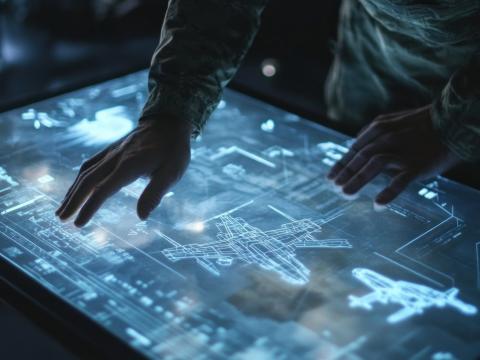NATIONAL SECURITY: IT'S STILL THE ECONOMY STUPID ISN'T IT?
With the ninth anniversary of the 9/11 attacks and I was both sobered and renewed by the way the Office of Naval Intelligence (ONI) remembered the eight people it lost during the attack on the Pentagon in a simple but eloquent ceremony at the National Maritime Intelligence Center (NMIC). What impressed me was the palpable sense of mission at ONI driven by personal loses that is motivating my shipmates at Naval Intelligence to both punish those who attacked us on 9/11 and to protect our nation’s flank from a deadly disruptive maritime attack. Given what I know about the rest of the IC I don’t believe that ONI is unique in the IC with its sense of mission for protecting our security, but rather emblematic of a community that is doing a difficult job as best it can. Having been a part Naval Intelligence that wore down and wore out the Soviet naval strategic threat to the free world, I drove away from Suitland feeling not just connected to this current generation of intelligence professionals, but confident that that the security of our nation is in good hands.
Picking up on what I encountered at ONI, I agree with Freed Zakaria’s early September NEWSWEEK article that as result of America’s massive response to 9/11, including a 250% increase in intelligence spending, that we have successfully minimized Al Qaeda’s capabilities to organize and deliver a spectacular attack though we have not muted Al Qaeda’s pernicious intentions to kill Americans or to destroy our nation. Because of this, reasonable people can now disagree about whether it is necessary it to continue to assert military force in Afghanistan and whether $75 billion is too little or too much for a democracy to spend on intelligence. This is a good place to be, but it comes with costs as new issues and threats have morphed from 9/11, including:
Ø Defining the balance between security and civil liberty
Ø The security of our cyber infra-structure
Ø Pakistan as a failed Moslem state with nuclear weapons
Ø The continuing debt crisis
Since 9/11 the nation has engaged in a yet unresolved debate between civil liberties and security with the elected leadership reflecting the views of their constituents of wanting both in equal measure. But as documented by a 9/11 Commission report released in September, Al Qaeda is now turning to people with some type of US person status to evade detection and surveillance by the US Intelligence Community. In its original 2004 report, the 9/11 Commission warned that “the wall” between intelligence agencies and law enforcement contributed to Al Qaeda’s attack on the World Trade Center and the Pentagon being successful. In theory, the wall has been torn down; however, the lack of crosstalk between the IC (emails to a radical Inman in Yemen) and Army criminal investigators in the case of the Fort Hood shooter makes Governor Kean’s point that the US is ill prepared to identify and stop “home grown terrorism.” Before proceeding into constitutionally uncharted areas of surveillance on US persons, it is, of course, reasonable for the IC to expect the Congress to express the will of the American people on the balance they want between security and civil liberties. Unfortunately, this important question has become a partisan political issue resulting in debate and posturing, but no effective public policy to enhance the security of the American people.
This leads naturally to a consideration of what is the role of the IC in cyberspace where there is a documented threat to both the individual well being of US citizens as well as to the nation’s infrastructure. Deputy Secretary of Defense William Lynn in his seminal article Defending a New Domain: The Pentagon’s Cyberstrategy (http://www.foreignaffairs.com/articles/66552/william-j-lynn-iii/defending-a-new-domain), which appears in the September/October edition of Foreign Affairs, reminds us that it is difficult to ascertain the nationality let alone the identity of bad actors in cyberspace. He goes on to observe that because of the nature of Information Technology (IT) the barriers to entry for cyberspace are relatively low and offensive capabilities will almost always be ahead of defensive ones. Given these conditions it should be apparent that in order to conduct effective intelligence, surveillance and reconnaissance (ISR) in cyberspace the IC is going to need policy relief from collecting on US persons. To be clear, Cyberspace epitomizes the unaddressed policy and legal issues associated with the convergence of domestic and foreign threats to the security of the United States that manifested itself on 9/11.
Deputy Secretary Lynn goes on to express his concerns about how ineffective traditional means of diplomatic, economic, or military deterrence are in cyberspace, but how effective would they be against Pakistan as a failed state that lost control of its nuclear weapons with its indigenous population of Al Qaeda radicals? The monsoonal floods in Pakistan that are straining the central government’s ability to respond to its citizen’s basic needs make this more than an academic question. In late September Osama bin Laden posted video chastising Muslim countries for not coming more quickly and generously to the aid of the Pakistani people. David Ignatius reports from Pakistan that flood victims there are more aware of US drone attacks in their country than they are that US helicopters are delivering food in the disaster area. Should Pakistan become a failed state unable to provide basic government services for its citizens, what is disconcerting is that keeping track of nuclear weapons in a failed state is not something the IC is well versed in (recall Russia after the fall of the Soviet Union). Moreover, if we understood Al Qaeda’s patterns of operation in Pakistan we would have captured or killed bin Laden by now. Given that we understand that Al Qaeda and its affiliates use the internet as its C4ISR backbone, and that 80 percent of internet traffic travels through servers based in the US, the IC again encounters the convergence of domestic and foreign intelligence issue in protecting America from “loose nukes.”
Throughout the response to 9/11, the US has been following an ill conceived economic policy of “guns and butter” by borrowing the money to fight lengthy wars in Iraq and Afghanistan while bulking up the IC and increasing entitlements. The sheer size of the national debt as it approaches a 100% of annual Gross National Product (GNP) means that the neither the President, the Congress, nor the Federal Reserve has any effective options for responding to economic or national security perturbations. In fact, Chairman of the Joint Chiefs of Staff Admiral Mike Mullen is on record saying that the size of the national debt is in fact a matter of national security. Understanding that continued top line growth experienced since FY 2004 is ending, Secretary Gates has told the Department of Defense to find $100 billion dollars (conservatively 15% of its annual budget) in savings over the next five years that can be reinvested for meeting military needs. Director of National Intelligence (DNI) Jim Clapper has quietly issued a similar directive to the IC and supports Gates’ zero based review of Military Intelligence due on 01 November.
The good news is that since 9/11, despite great expense, the US has severely weakened Al Qaeda and driven its infrastructure into the Federally Administered (no pretense of government!) Tribal Areas (FATA) in Pakistan along the Afghan border. The bad news is that ensconced in the FATA, Al Qaeda can both devise and execute cyber attacks against friendly governments if not the US all while working to turn Pakistan into a failed nuclear state. Ironically it was a long expensive war in Afghanistan coupled with spending to keep pace with US strategic forces that literally broke the bank in Moscow. To deal with this emerging threats discussed here, the United States will need to borrow money it doesn’t have, choose to make economic sacrifices, or use the intelligence, military, diplomatic, and economic capabilities it has more efficiently and adroitly.
That’s what I; what do think?



Comment
Joe,
JoeMazz,
Thanks Rex. I believe people
Dave, thanks for your
Comments